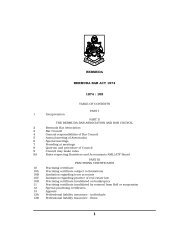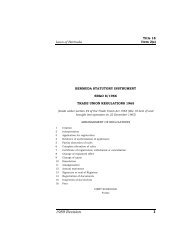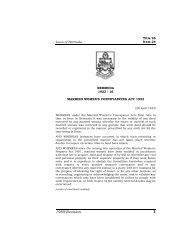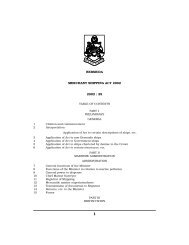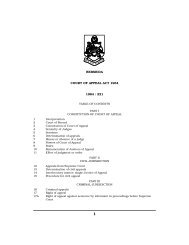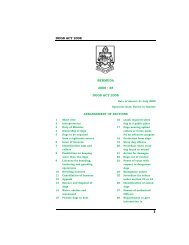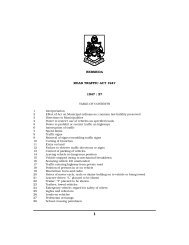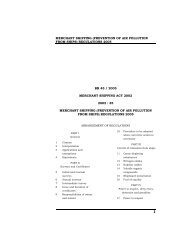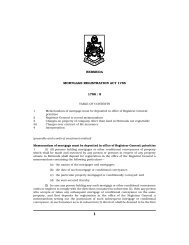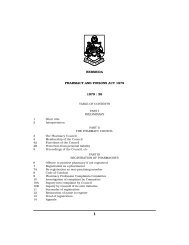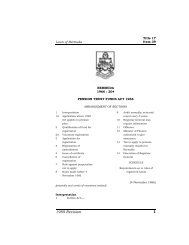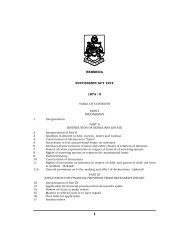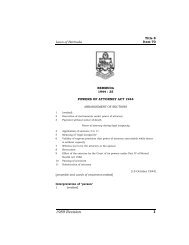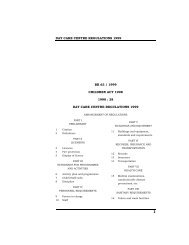Merchant Shipping (Manning of Ships) Regulations 2011.pdf
Merchant Shipping (Manning of Ships) Regulations 2011.pdf
Merchant Shipping (Manning of Ships) Regulations 2011.pdf
Create successful ePaper yourself
Turn your PDF publications into a flip-book with our unique Google optimized e-Paper software.
QUOFAT AFUE RNTBERMUDAMERCHANT SHIPPING (MANNING OF SHIPS) REGULATIONS 2011BR 52 / 2011TABLE OF CONTENTS12345678910CitationInterpretationApplicationShipowner’s responsibilitiesSafe <strong>Manning</strong> DocumentMedical care on boardExceptional circumstancesPenaltiesInspectionRevocationsThe Minister responsible for Maritime Administration, in exercise <strong>of</strong> the powerconferred by sections 3 and 93 <strong>of</strong> the <strong>Merchant</strong> <strong>Shipping</strong> Act 2002, makes the following<strong>Regulations</strong>:Citation1 These <strong>Regulations</strong> may be cited as the <strong>Merchant</strong> <strong>Shipping</strong> (<strong>Manning</strong> <strong>of</strong> <strong>Ships</strong>)<strong>Regulations</strong> 2011.Interpretation2 In these <strong>Regulations</strong>—“Act” means the <strong>Merchant</strong> <strong>Shipping</strong> Act 2002;“chief mate” includes a person designated as staff captain where that term iscustomary;1
MERCHANT SHIPPING (MANNING OF SHIPS) REGULATIONS 2011“commercial activity” means any activity or employment <strong>of</strong> the vessel for which acontract or charter party is in force and includes the carriage <strong>of</strong> any cargo orpersons for reward;“IMO” means the International Maritime Organization;“pleasure vessel” means—(a)(b)(c)a vessel which at the time it is being used is—(i)(ii)in the case <strong>of</strong> a vessel wholly owned by an individual or individuals,used only for the sport or pleasure <strong>of</strong> the owner or immediate family orfriends <strong>of</strong> the owner; or in the case <strong>of</strong> a vessel owned by a bodycorporate , used only for sport or pleasure and on which the passengersare employees or <strong>of</strong>ficers <strong>of</strong> the body corporate, or their immediatefamily or friends; andon a voyage or excursion which is one for which the owner does notreceive money for or in connection with operating the vessel or carryingany person, other than as a contribution to the direct expenses <strong>of</strong> theoperation <strong>of</strong> the vessel incurred during the voyage or excursion, and noother payments are made by or on behalf <strong>of</strong> users <strong>of</strong> the vessel otherthan by the owner; orany vessel wholly owned by or on behalf <strong>of</strong> a member’s club formed for thepurpose <strong>of</strong> sport or pleasure which, at the time it is being used, is usedonly for the sport or pleasure <strong>of</strong> members <strong>of</strong> that club or their immediatefamily; and for the use <strong>of</strong> which any charges levied are paid into club fundsand applied for the general use <strong>of</strong> the club; and no other payments aremade by or on behalf <strong>of</strong> users <strong>of</strong> the vessel other than by the owner;for the purposes <strong>of</strong> this definition, “immediate family” means in relation toan individual, the husband or wife <strong>of</strong> the individual and a relative <strong>of</strong> theindividual or the individual’s spouse, and “relative” means brother, sister,ancestor or lineal descendant.“Principles <strong>of</strong> Safe <strong>Manning</strong>” means the Principles <strong>of</strong> Safe <strong>Manning</strong> set out inAssembly Resolutions A.890(21) and A.955(23) <strong>of</strong> the IMO and includes anysubsequent amendments to those Resolutions;“seafarer” means any person who is employed, or engaged, or works in any capacityon board a ship and where there is doubt as to whether a person working orengaged on a ship is a seafarer, the Minister shall make a determination, andshall be guided by the advice and guidance <strong>of</strong> the International LabourOrganization;“second engineer” includes an <strong>of</strong>ficer designated as staff engineer where that termis customary;“shipowner” means the owner <strong>of</strong> the ship or another organization or person, suchas the manager, agent or bareboat charterer, who has assumed theresponsibility for the operation <strong>of</strong> the ship from the owner;2
MERCHANT SHIPPING (MANNING OF SHIPS) REGULATIONS 2011“STCW Convention” means the International Convention on Standards <strong>of</strong> Training,Certification and Watchkeeping for seafarers 1978, as amended from time totime by the International Maritime Organization.Application3 These <strong>Regulations</strong> apply to—(1)(2)Bermuda ships wherever they may be other than—fishing vessels;pleasure vessels; andvessels owned and operated by a Government department or agency fornon-commercial purposes; andto the extent specified in regulation 9, these regulations apply to otherships that are not Bermuda ships when in a port in Bermuda otherthan—fishing vessels;pleasure vessels; andwarships, naval auxiliaries and other ships owned or operated by astate and not engaged in commercial activity.Shipowner’s responsibilities4 (1) Every shipowner shall ensure that, ins<strong>of</strong>ar as the ships for which he isresponsible are concerned—(a)(b)(c)(d)(e)(f)(a)(b)(c)(a)(b)(c)every <strong>of</strong>ficer is qualified in accordance with the STCW Convention inrespect <strong>of</strong> any function he is to perform on board that ship;every other seafarer is trained in accordance with the requirements <strong>of</strong> theSTCW Convention in respect <strong>of</strong> any function that he is to perform on boardthat ship;documentation and data relevant to all the seafarers employed on his shipsare maintained and readily available for inspection;every master and <strong>of</strong>ficer is pr<strong>of</strong>icient in the English language;when more than one language is spoken on board a ship, a commonworking language is established for safety procedures; andevery master, chief mate, chief engineer and second engineer is fullyconversant with the Bermuda legal and administrative processes to theextent appropriate to their role on board.3
MERCHANT SHIPPING (MANNING OF SHIPS) REGULATIONS 2011Safe <strong>Manning</strong> Document5 (1) The Minister shall, on receipt <strong>of</strong> an application from a shipowner whichcomplies with the Principles <strong>of</strong> Safe <strong>Manning</strong>, issue a certificate known as a Safe <strong>Manning</strong>Document to that shipowner.(2) Every shipowner shall ensure that, for every ship <strong>of</strong> over 500 GT for which heis responsible, that—(a)(b)(c)there is in force a Safe <strong>Manning</strong> Document issued by or on behalf <strong>of</strong> theMinister except that a Safe <strong>Manning</strong> Document need not be issued for avessel <strong>of</strong> less than 500 GT or for a pleasure vessel but such a vessel mayrequest such a document in accordance with paragraph (1) and may beissued with one on request;the manning <strong>of</strong> the ship is maintained in accordance with the levelsspecified in the document; andthe manning levels on board the ship are regularly reviewed in accordancewith the Principles <strong>of</strong> Safe <strong>Manning</strong> and that the Minister is informed <strong>of</strong>any changes in the construction, operation, employment or status <strong>of</strong> theship that may lead to a change in the minimum safe manning, bearing inmind those principles.(3) Every master <strong>of</strong> a ship <strong>of</strong> more than 500 GT to which these <strong>Regulations</strong> applyshall ensure that the ship does not proceed to sea unless there is on board a Safe <strong>Manning</strong>Document and that the manning <strong>of</strong> the ship is in compliance with it.Medical care on board6 In any ship in which no doctor is carried the shipowner shall ensure that there isat least one seafarer on board, who may be the master, who is nominated to be in charge<strong>of</strong> medical care and the administration <strong>of</strong> medicines and who is qualified in accordance withthe STCW Code Section A-VI/4 for persons designated to take charge <strong>of</strong> medical care onboard ship.Exceptional circumstances7 Notwithstanding the requirements <strong>of</strong> regulation 5(3), on any occasion when aseafarer employed in a position shown on the Safe <strong>Manning</strong> Document becomesincapacitated through accident, illness or is unable to fulfil his duties through some otherunforeseen circumstance such that the ship does not have the manning specified on theship’s Safe <strong>Manning</strong> Document, the ship may proceed to sea at the master’s discretionprovided that—(a)(b)(c)the duration <strong>of</strong> the voyage is no more than 21 days;in the event that it is the master who is unavailable, the vessel has a personon board who holds a certificate <strong>of</strong> competency showing that he is certifiedin the capacity <strong>of</strong> master;suitable arrangements for watchkeeping are made until the time when areplacement seafarer is expected to join the ship such that the minimum4
MERCHANT SHIPPING (MANNING OF SHIPS) REGULATIONS 2011rest requirements in the <strong>Merchant</strong> <strong>Shipping</strong> (Hours <strong>of</strong> Rest) <strong>Regulations</strong>2011 can be complied with;(d)(e)necessary adjustments are made to the ship’s emergency plans to allow forthe missing seafarer; andthe master informs the Bermuda Department <strong>of</strong> Maritime Administrationbefore sailing and when a replacement seafarer joins the ship.Penalties8 (1) Any shipowner who contravenes regulation 5(2) commits an <strong>of</strong>fence and isliable on summary conviction to a fine not exceeding $20,000.(2) Any master who contravenes regulation 5(3) commits an <strong>of</strong>fence and is liableon summary conviction to a fine not exceeding $15,000.Inspection9 (1) Any person duly authorised by the Minister may inspect any ship to whichthese <strong>Regulations</strong> apply when in a port in Bermuda and if he is satisfied that thearrangements for manning are not in accordance with the requirements stated in the ship’sSafe <strong>Manning</strong> Document he may detain the ship until the deficiency is rectified, but in theexercise <strong>of</strong> these powers he shall not detain or delay the ship unreasonably.(2) Any authorised <strong>of</strong>ficer <strong>of</strong> the Department <strong>of</strong> Maritime Administration whodiscovers that a Bermuda ship does not comply with the manning shown on her Safe<strong>Manning</strong> Document may—(a)(b)withdraw the vessel’s Maritime Labour Certificate until such time as thedeficiency is rectified; orif the vessel is in a port outside Bermuda, inform the port state authorityfor that port <strong>of</strong> the deficiency.Revocations10 <strong>Regulations</strong> 24, 25, 26, and 27, <strong>of</strong> the <strong>Merchant</strong> <strong>Shipping</strong> (Training, Certification,<strong>Manning</strong> and Watchkeeping) <strong>Regulations</strong> 2005, are hereby revoked.Made this 20th day <strong>of</strong> September, 2011Minister <strong>of</strong> Transport5



